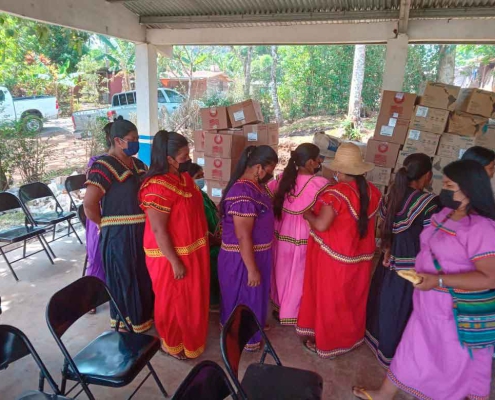Activities 2022

It also promotes integrated water resource management and encourages the protection of the watersheds that supply the water systems to be built in the program. However, difficulties have been identified in waste management, so it is necessary to reinforce compliance with this approach.
Finally, the program has a high component of integrating cultural diversity since it involves the indigenous peoples of the Ngäbe-Buglé region and relies on the long experience of DISAPAS, which applies a working methodology adapted and sensitive to these communities.
A small support program is also underway for developing the National Guide for Selecting Wastewater Treatment Technologies, with an in-kind donation of 125,000 euro from the Fund. In 2022, work has continued with the Interinstitutional Committee for Drinking Water and Sanitary Sewerage (CIAPAS), through which the participatory preparation of the Guide is being articulated under the direction of the Ministry of Health (MINSA). After several meetings, it has been established that the Guide will have the rank of Technical Guide, according to national parameters, and work has continued on the planning and preparation of operational documents, with the technical assistance of CEDEX and Tragsatec, for submission to AECID and subsequent approval process. In addition, work has been done on the preparation of the terms of reference of two important tenders within the framework of the Program: those corresponding to the consultancy for the preparation of the Guide, tendered by AECID, and the one related to the execution of a wastewater characterization campaign, tendered by MINSA, which will contribute to the basic information available to begin the process of preparing the Guide.
COUNTRY CONTEXT
Panama has a high percentage of the population with access to improved water (94%); however, there are specific areas where there is a significant gap, especially in some indigenous communities. For this reason, two of the Water Fund’s interventions in the country focus on indigenous and rural areas. The objective is to improve access to water and sanitation through the construction of systems, community management of these systems, and promoting of local development plans by strengthening sector institutions.
These programs have strategic components for the sustainability of the services implemented and pay special attention to the gender component, incorporating strategies for improving and empowering women at the community level. An example of the work carried out is the creation of the School for Women Leaders, focused on the training and empowerment of indigenous women in the Ngäbe-Buglé region, to promote women’s participation in the Water and Sanitation Boards, as well as in other community decision-making spaces.

